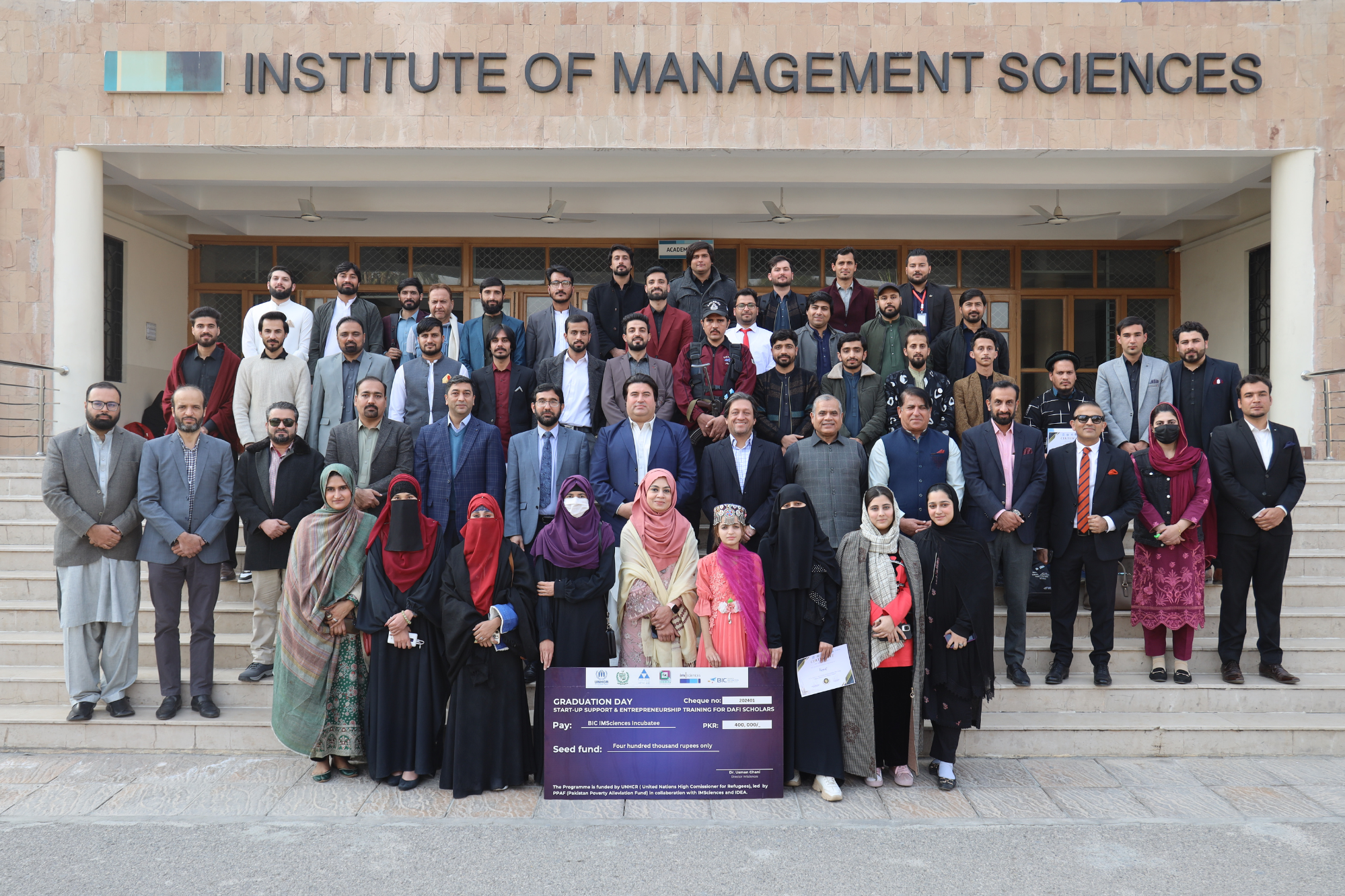Afghan Refugees Complete UNHCR-PPAF Empowerment Initiative
Peshawar (31 December 2024)

Peshawar, December 31, 2024: Peshawar, December 31, 2024: Under the UNHCR-funded Poverty Graduation Program, led by the Pakistan Poverty Alleviation Fund (PPAF) and implemented by IDEA, the Institute of Management Sciences (IM Sciences), Peshawar, hosted a graduation ceremony to celebrate the achievements of 30 Afghan refugee graduates. These individuals successfully completed an Enterprise Start-up Support and Entrepreneurial Skills Training Program, designed to empower Afghan youth by enhancing their business development capabilities and contributing to Afghanistan's sustainable economic growth.
In his welcoming address, Prof. Dr. Usman Ghani, Director of IM Sciences, emphasized the institution’s commitment to fostering impactful initiatives that contribute to the socio-economic empowerment of marginalized communities. He lauded the collaboration between IM Sciences, UNHCR, and PPAF as a model for addressing critical challenges such as unemployment and skill development among Afghan refugees.
Dr. Qazi Waheed uz Zaman, Head of the Business Incubation Center at IM Sciences, provided a comprehensive overview of the UNHCR-PPAF partnership program, outlining its milestones over the past five years. He highlighted how this partnership has supported thousands of refugee households through innovative interventions, including asset transfers, skills training, and entrepreneurship development.
Addressing the audience, Mr. Arshad Rashid, Chief Programs at PPAF, emphasized the program’s alignment with national and international development goals, particularly its focus on gender inclusion and sustainable poverty alleviation. He shared findings from the latest impact assessment, revealing a 54% graduation rate out of poverty among the beneficiaries, along with significant increases in household income and productive asset quality.
Mr. Shakeel Safi, Commissioner for Afghan Refugees in Khyber Pakhtunkhwa, expressed his commitment to supporting refugees and assured that the Commissionerate's doors would always be open for such initiatives. He emphasized his willingness to promote refugee ideas on various platforms, including the Chamber of Commerce. Additionally, he expressed interest in collaborating with IM Sciences on activities aimed at refugee welfare. Mr. Safi extended his gratitude to UNHCR, PPAF, and IDEA for organizing this meaningful program and reaffirmed CAR’s readiness to work closely with PPAF and UNHCR to enhance refugee welfare.
Mr. Muhammad Riaz, Livelihood and Economic Inclusion Officer for UNHCR, stated that UNHCR employs the unique Poverty Graduation Approach to deliver sustainable livelihood support to the most vulnerable Afghan refugee groups, including women, youth, and smallholder farmers. This initiative empowers them to build livelihoods, increase incomes, and diversify assets, enabling steady progress out of poverty.
Mr. Sohrab Altaf, Field Associate for UNHCR, echoed these sentiments by sharing inspiring stories of beneficiaries who overcame adversity to establish sustainable livelihoods. He underscored the importance of continued investment in initiatives that empower refugees to contribute positively to their communities. He added that this final session and closing ceremony marked the successful completion of the training program, showcasing the scholars' potential and their readiness to make an impact in the business startup ecosystem.
Mr. Amad, Executive Director of IDEA, highlighted the role of innovation and entrepreneurship in the program's success. He called for sustained collaboration among all stakeholders to expand the program's reach and ensure the long-term socio-economic integration of Afghan refugees. He assured that IDEA would actively support the development of linkages with the private sector and remain committed to helping these startups scale their operations both within Pakistan and Afghanistan.